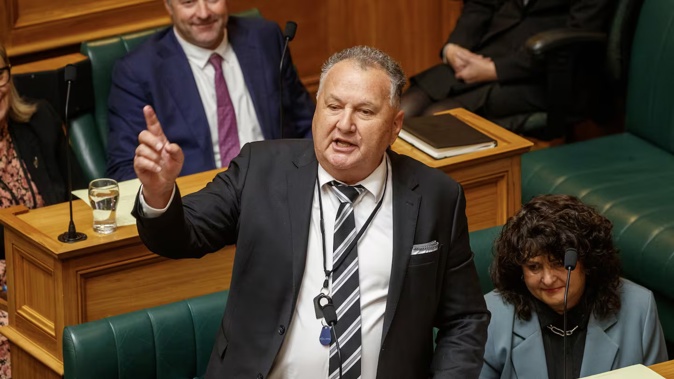
NZ First Minister Shane Jones is drafting legislation to require a single settlement with Ngāpuhi rather than multiple agreements with smaller groups, saying there is no benefit to turning the country’s largest iwi into “confetti”.
Jones has warned against the Ngāpuhi settlement being “hijacked” by a sovereignty debate after the Government last week declared it would never agree to treaty settlements that disputed whether the Crown was sovereign.
For the first time, a clause was included in an initial deed (drawn up under the previous Labour Government) with East Coast iwi Te Whānau-ā-Apanui where the iwi and the Crown “agreed-to-disagree” on who held sovereignty.
The coalition Government said it was not prepared to progress the settlement without that being removed.
This prompted Pita Tipene, a leader of Far North iwi Ngāti Hine, to rule out a settlement under this Government, saying his people were “just as staunch and ferocious in saying we hold authority and sovereignty over our own” as the Crown was in asserting its sovereignty.

Pita Tipene. Photo / Dean Purcell
Speaking on the wider confederation of Ngāpuhi iwi in the Far North, Jones said he did not want an “insoluble debate about tribal sovereignty” to slow down progress on Ngāpuhi settlement.
He referenced the 2014 Waitangi Tribunal ruling declaring Ngāpuhi chiefs had never agreed to give up their sovereignty when they signed Te Tiriti in 1840.
He said although the findings may be of historical significance, they must not “eclipse the modern-day challenges that exist within the rohe of Ngāpuhi”.
“There is no reason why matters of powers and authority don’t get continually discussed in the future, but it must outstrip the importance of a singular Ngāpuhi settlement,” the NZ First deputy leader said.
“I think that each hapū probably wants a pony and it’s understandable that maybe they want to protect some of the fishing grounds or recover some of the cultural resources ... and that’s not to be diminished.
“But what is really needed is a powerful economic endowment that will see them through the years.”

Shane Jones with Government MPs Gerry Brownlee, Winston Peters and David Seymour during a pōwhiri at the treaty grounds earlier this year. Photo / Dean Purcell
Treaty Negotiations Minister Paul Goldsmith said the Government’s preference was for a single commercial settlement with Ngāpuhi but it was open to settlements with smaller groupings if it got the deal done.
But Jones said the latter option would never happen as long as NZ First was in Government.
“I have seen the difficulties when other rohe (areas) have broken themselves up into tiny economically insignificant iwi units. They lack the capital robustness because they’ve created these units that are too small to be economically relevant.”
The party would present the member’s bill to coalition partners in spring, a move “reflective of new beginnings”, Jones said.
He signalled that the bill might have to wait to be included in future coalition agreements, but that it would “give Ngāpuhi leadership something to gnaw on that’s concrete and tactile”.
“Any bill that we have will explicitly state there is no separate Ngāpuhi hapū sovereignty. There’s zero tolerance for any suggestion that there is separate hapū sovereignty.”
Jones said he had “probably put more capital into Ngāpuhi than any other minister” and has been pushing for a single Ngāpuhi entity approach for “about 30 years”.
“Tai Tokerau already has a host of harrowing socioeconomic data and that’s why we will not be agreeing with anything other than a pan-Ngāpuhi approach.

Shane Jones at the Waitangi Treaty Grounds. Photo / Dean Purcell
“It’s evident to us that the hapū-centric approach has meant the North has missed out for the last 20 years and it’s likely to miss out for another 20 years.
“If we maintain this hapū-centric approach, I do not believe by 2040 we will have a Ngāpuhi settlement.”
In an April 2024 interview with Q+A with Jack Tame, Ngāpuhi chair Mane Tahere said there was some “deep kōrero” happening within marae and hapū around a settlement, reparation and the language to be used.
“I think that is exciting and really, really positive. What we do have to be sure of is protection of our hapū and our people.
“The number one question is ‘what is settlement?’ ... and we as Ngāpuhi need to have a conversation ... is it settlement of language, is it reparation? What does that actually mean?
“The wealth of New Zealand was built on the shoulders of Ngāpuhi.
“Our land was stripped, we were literally a landless iwi and the biggest iwi of Aotearoa. So when you’re looking at the kind of deficit it is pretty staggering,” Tahere told Q+A with Jack Tame.
“We have to really dive deep into educating our people into finding the balance – whether we settle or not, and we go for that scenario. There is a hardline benefit to receiving a financial package."
Julia Gabel is a Wellington-based political reporter. She joined the Herald in 2020 and has most recently focused on data journalism.
Take your Radio, Podcasts and Music with you









